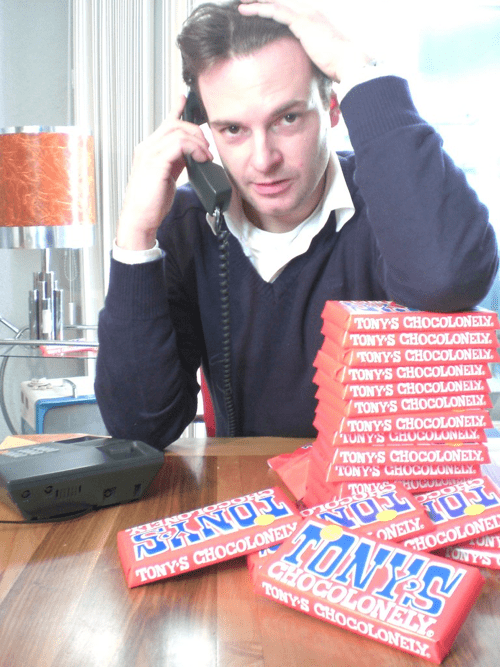Description
Working to End Child Slavery, One Chocolate Bar at a Time

Teun van de Keuken, AKA Tony.
Slavery-free chocolate might seem like an unnecessary distinction. Isn’t all chocolate slavery-free? Unfortunately, no. More than half of the world’s cocoa comes from just two places; Côte D’Ivoire and Ghana. The farmers who grow it often live in extreme poverty – an average of $1 a day per family member. Deforestation and corporate influence coupled with government interference keep these farmers poor and struggling.
As a result, farmers are forced to put their children to work, often in dangerous and difficult positions. NORC estimates that 1.56 million children across Côte D’Ivoire and Ghana work in cocoa production and that another 30,000 people are victims of modern-day slavery.
The roots of the chocolate problem are complex. There’s not one single comprehensive answer. However, there are people trying to help.
One of those people is Teun van de Keuken, AKA Tony. Tony is a journalist from the Netherlands who learned about the horrors of the chocolate trade in 2003. He was appalled that such a massive story was receiving no news coverage and decided to take matters into his own hands. In order to raise awareness, he filmed himself eating a pile of chocolate bars and then contacted the police, asking to be arrested as an accessory to child slavery. The courts chose not to prosecute, but Tony continued his efforts to shed light on child labor and slavery.
Dissatisfied with the impact of journalism alone, Tony decided to manufacture his own slavery-free chocolate. In 2005, Tony launched his chocolate bars under the name Tony’s Chocolonely, a reference to the lonely business of improving the chocolate industry.
The Future of the Chocolate Industry is Slavery-Free
The bars, as well as the message they represented, were a hit. Today, Tony’s Chocolonely is available in dozens of flavors and stocks the shelves in stores like ours. However, their mission remains unchanged. Above all, Tony’s is committed to completely eliminating the presence of child labor and slavery throughout the whole chocolate industry, not just within their company.
They subscribe to five guiding principles designed to make that dream a reality. Their ultimate goal is to make slavery-free chocolate the norm.
1) Traceable Cacao Beans
Tony’s is dedicated to making sure every single bean they use is traceable. They source exclusively from specific partner co-ops in Ghana and Côte D’Ivoire. Consequently, they can form relationships with suppliers and guarantee the quality of the product as well as the safety and security of the farmers.
2) Higher Price
Tony’s pays a higher premium for its raw materials. Conglomerates keep the market price artificially low. Consequently, farmers are unable to earn what they deserve. By paying extra on top of that price, Tony’s is able to ensure that its producers are getting a fair wage.
3) Strong Farmers
Equally important as paying higher prices for beans is reinvesting in the communities that grow them. The goal is to “facilitate the professionalization of the operations and organization of our partner co-ops, assist them in achieving the economies of scale, and to create commitment and trust amongst the farmers.” By uniting, farmers can command more power in price and labor negotiations.
4) Long Term
Tony commits to working with each producer for at least five years. This means these farmers can depend on the higher premiums to reinvest in their farms, save up, and foster a supportive environment for their futures.
5) Improved quality and productivity
This means educating farmers about efficient, effective, and environmentally friendly agriculture. Not only does this benefit the immediate environment, but it’s better for the planet overall. Moreover, improved farming practices result in higher quality beans and better crop yields, which enables farmers to make more money.
On the Way to Slavery-Free Chocolate
The journey to improve working conditions for cocoa farmers is long and arduous. Although things have been improving steadily, there’s work to be done for as long as slavery exists. However, as consumers, we have choice and influence; purchasing responsibly is one of the most powerful tools at our disposal.
Check out Tony’s Chocolonely slavery-free chocolate bars, as well as an extensive selection of other Fair Trade chocolates.
Learn more about fair trade certifying organizations.
